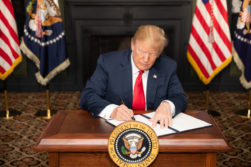
Renewed US sanctions on Iran making an impact. President Donald J. Trump signs an Executive Order on Iran Sanctions. Illustrative. (Official White House Photo by Shealah Craighead)
The United States on Wednesday harshly criticized Iran’s recent nuclear advancements in a meeting with other world powers at the United Nations’ nuclear watchdog Board of Governor’s meeting, while separately US President Donald Trump threatened increased sanctions on Iran on Twitter. Recent announcements by Iran that the Islamic Republic had exceeded certain nuclear fuel limits imposed under the nuclear deal have been confirmed by International Atomic Energy Agency Director General Yukiya Amano, with those reports published to the IAEA website.
In view of Iran’s moves, US Ambassador Jackie Wolcott told the 35-nation Board of the IAEA, “There is no credible reason for Iran to expand its nuclear program, and there is no way to read this as anything other than a crude and transparent attempt to extort payments from the international community.”
“This is an interpretation the Iranian regime itself readily admits, stating openly that it will continue to engage in such provocations until it receives various economic benefits.”
Wolcott, in comments posted to the US Mission to International Organizations in Vienna website, said the US is “committed to denying” Iran receives such economic benefits as a result of the their latest aggressive actions. President Trump took it one step further, warning that more sanctions were on the way, while again slamming the nuclear deal with Iran that the US exited last year.
“Iran has long been secretly ‘enriching,’ in total violation of the terrible 150 Billion Dollar deal made by John Kerry and the Obama Administration. Remember, that deal was to expire in a short number of years. Sanctions will soon be increased, substantially!” tweeted Trump on Wednesday.
However, getting full weight of the United Nations behind sanctions on Iran—despite the “snapback” provisions in the Iran nuclear deal intended to re-impose sanctions as a penalty for violating the accord—looks difficult. CBS, in their report on the IAEA Board meeting, noted that the UN Security Council is the entity tasked with sanctions and two veto-wielding members—China and Russia—have accepted Iran’s assertion the US is to blame in the nuclear dispute.
Israel, meanwhile, has been loudly calling for the sanctions to resume as Iran violates key provisions of the nuclear agreement, known as the Joint Comprehensive Plan of Action (JCPOA). Israeli Ambassador to the UN Danny Danon posted to Twitter that Iran’s nuclear violations are “no surprise to those of us who never bought the fiction that the Iranian regime wanted to normalize its behavior.”
He followed up that tweet with another urging action. “I call on the European leaders to wake up before it is too late and to stop the terrorist regime. Their restraint only serves to encourage Tehran to pursue its dangerous ambitions. They must join President Trump in applying sanctions.”
Israeli Prime Minister Benjamin Netanyahu, in comments released by his office on Monday, said, “Now Iran is trying to lash out to reduce the pressure. They attack tankers, they down American drones, they’re firing missiles at their neighbors. It’s important to respond to these actions not by reducing the pressure, but by increasing the pressure.
We should stand up to Iran’s aggression now. And Europe should back the sanctions instituted by President Trump. We certainly did.”
Netanyahu pointed to the secret Iranian nuclear archive, exposed by Israeli operatives, as evidence that “the deal was always based on a lie: that Iran was not seeking nuclear weapons.”
That nuclear archive was also highlighted by Wolcott in her speech at the IAEA on Wednesday. “Importantly, as Iran now expands sensitive nuclear activities, Iran must address why it secretly retained an archive of materials from its past nuclear weapons program well after the conclusion of the nuclear deal,” said Wolcott.
“Why did Iran seek to preserve this information and expertise, if not to keep its nuclear options open?”
Despite all that has happened, Wolcott offered a diplomatic olive branch to Iran for new negotiations on Iranian behavior, including even the “possibility of a full normalization of relations” with the US. But that can only be achieved through diplomacy and de-escalation.
“Nuclear escalation will certainly not strengthen Iran’s position, but instead lead to further isolation and pressure,” said Wolcott. “The path forward remains clear: in order to end to sanctions pressure, Iran must meet our diplomacy with diplomacy, end its destabilizing actions, and take lasting steps that permanently close off any pathway to nuclear weapons.”
(By Joshua Spurlock, www.themideastupdate.com, July 10, 2019)
